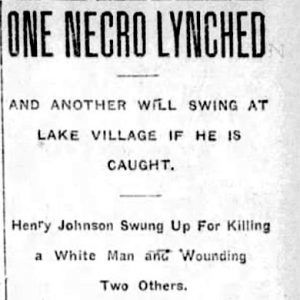calsfoundation@cals.org
Henry Johnson (Lynching of)
On November 3, 1903, an African-American man named Henry Johnson was hanged in Lake Village (Chicot County) for his alleged involvement in a shooting at a saloon. It is not possible to specifically determine who Johnson was, since the 1900 census lists more than one Black man named Henry Johnson in Chicot County.
According to newspaper accounts, around 2:00 a.m. on November 3, Frank Anderson, described by the Pine Bluff Daily Graphic as “a prominent businessman of Lake Village,” and Baldy Vinson, “the well known Little Rock attorney,” were drinking in Joe Frame’s saloon in Lake Village. The Daily Independent of Newport (Jackson County) reported that some of the Black waiters in the saloon had been “throwing beer around the place,” and Anderson resented their behavior. Some of the Blacks then used profane language, and when Anderson objected, Ed Coleman, one of the African Americans, reportedly pulled a pistol and began shooting. Anderson was killed, Vinson sustained two flesh wounds, and Frame was shot in the foot. In addition, a Black woman named Ella McDowell was shot in the back. Coleman fled, and a posse was sent in pursuit. Henry Johnson, who was also at the scene and suspected of participating in the fight, was arrested and jailed.
At noon the following day, a mass meeting was held at the courthouse. A committee on law enforcement was appointed, and there was much discussion about what to do with Johnson. Although it was noted that Circuit Judge John Wood would soon be holding a special session of court in town, and that Johnson could be tried there, cooler heads did not prevail, and according to the St. Paul Daily Globe, “a large number rushed out of the court house, shouting ‘Hang him!’ ‘Hang him!’” Although the newly built Chicot County Jail was constructed with steel, in the absence of Sheriff Frank Strong, who was in Little Rock (Pulaski County), the crowd used sledgehammers and railroad irons to break in and remove Johnson. He was taken to the lakefront in the middle of town and hanged, and his body remained hanging until the coroner cut it down at 5:00 p.m. According to the Daily Graphic, reflecting tropes common to such stories, “Not a shot was fired and there was no special demonstration, the mob proceeding quietly but with determination.”
According to the Forrest City Times, there was no unrest among the local Black population following the lynching. Noting that African Americans in the county outnumbered whites five to one, the newspaper reported that “there is no fear of further trouble as all the officers are white men and have heretofore been able to keep down any serious race trouble.” Although Governor Jeff Davis offered a reward of $100 for the capture and conviction of Ed Coleman, no news appeared of his arrest, and it is assumed that he escaped.
For additional information:
“Lake Village Tragedy.” Pine Bluff Daily Graphic, November 4, 1903, p. 1.
“Lynching at Lake Village.” Forrest City Times, November 6, 1903, p. 1.
“Mob Lynched Negro at Lake Village.” Daily Independent (Newport, Arkansas), November 4, 1903, p. 1.
“Negro Lynched for Being Near a Fight.” St. Paul Globe, November 4, 1903, p. 8.
“One Negro Lynched.” Pine Bluff Daily Graphic, November 4, 1903, p. 1.
“Reward Offered.” Newark Journal (Newark, Arkansas) December 4, 1903, p. 8.
Nancy Snell Griffith
Davidson, North Carolina


 Henry Johnson Lynching Article
Henry Johnson Lynching Article 



Comments
No comments on this entry yet.